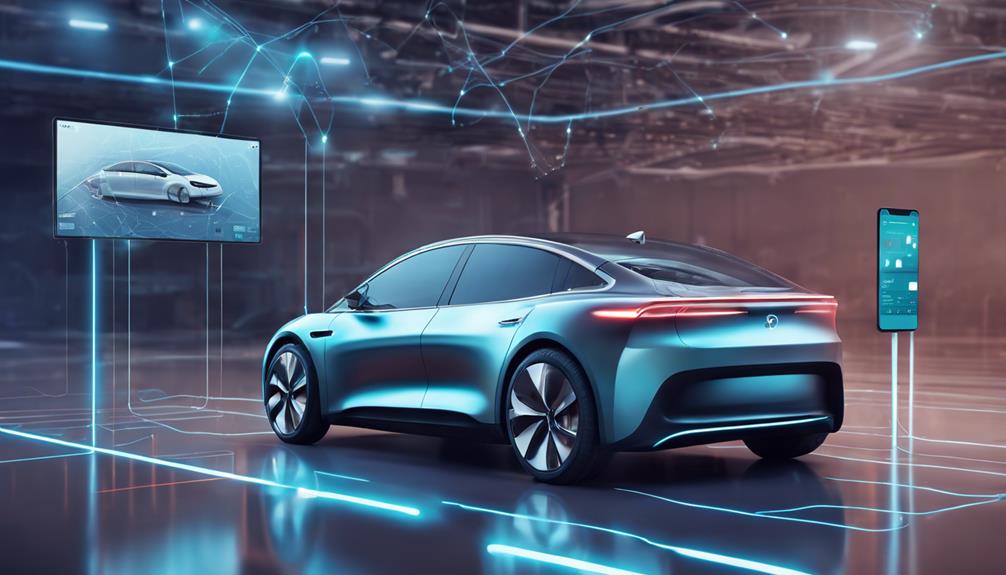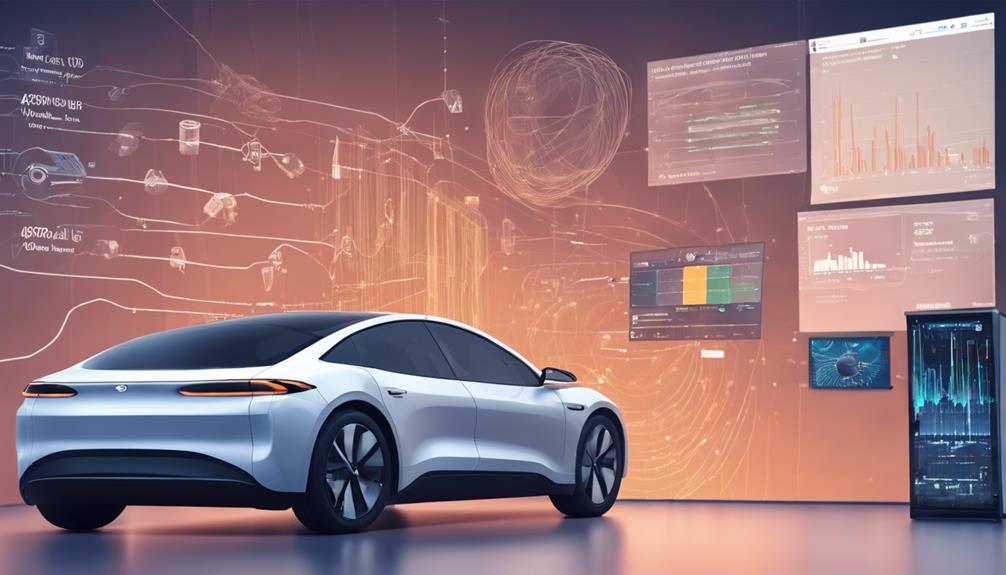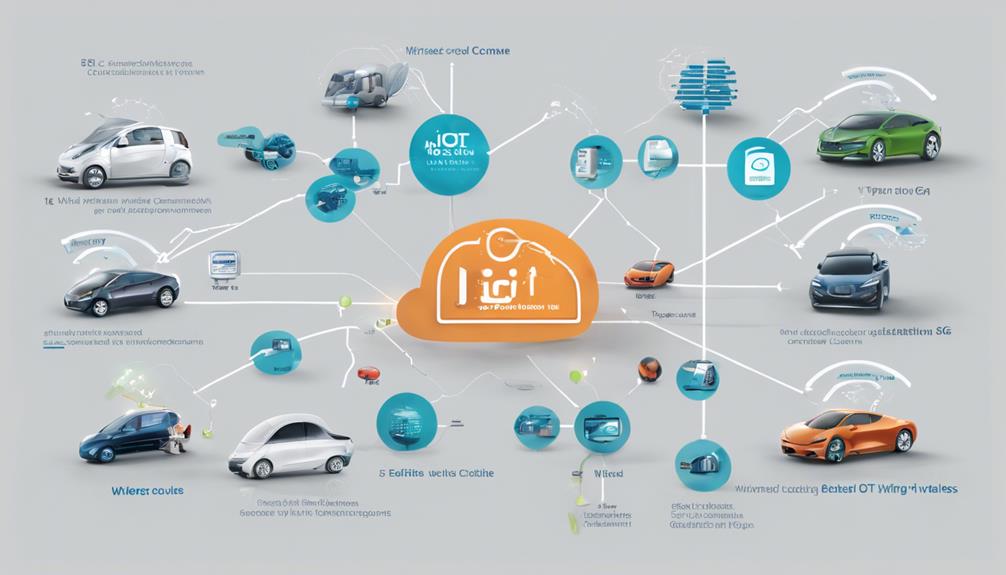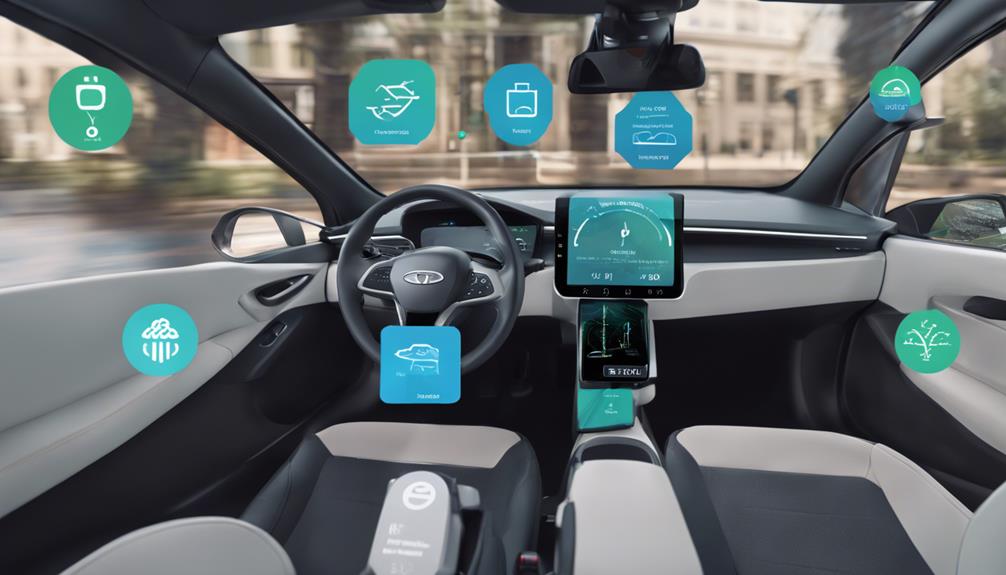In electric vehicles, IoT technology guarantees remote monitoring, optimizes energy consumption, extends driving range, and enhances charging infrastructure. Real-time data analysis enhances efficiency and sustainability in the automotive industry. By utilizing IoT in EVs, you can benefit from improved energy optimization, advanced predictive maintenance, and streamlined charging procedures. The seamless integration of IoT guarantees enhanced connectivity with charging stations and personalized services for an optimized driving experience. Explore how IoT solutions revolutionize the management and optimization of EV charging processes in pursuit of efficiency and sustainability in the electric vehicle industry.
Key Takeaways
- IoT optimizes energy consumption in electric vehicles through real-time data analysis.
- Enhanced connectivity between EVs and charging stations is ensured by IoT integration.
- Predictive maintenance reduces costs and enhances performance in electric vehicles.
- Real-time monitoring of essential parameters like motor temperature and speed is enabled by IoT.
- IoT solutions revolutionize charging processes, maintenance, and efficiency in the EV industry.
IoT Applications in EVs
The integration of IoT technology in electric vehicles revolutionizes the automotive industry by enabling remote monitoring and control of various vehicle systems for enhanced performance and user experience. Energy optimization is a key benefit derived from IoT applications in EVs. Through real-time data collection and analysis, these vehicles can optimize energy consumption, extending driving range and improving overall efficiency. Additionally, IoT technology plays a vital role in enhancing charging infrastructure for electric vehicles. By enabling communication between EVs and charging stations, IoT facilitates personalized services and streamlined procedures. Operators can utilize continuous data collection to monitor and manage charging points effectively, ensuring peak performance for EV users. This integration not only enhances the driving experience but also contributes to the sustainability and efficiency of electric vehicles in the modern automotive landscape.
Automotive IoT Solutions
Automotive IoT solutions offer enhanced data collection efficiency, enabling you to gather vital insights into your electric vehicle's performance. These solutions provide advanced vehicle connectivity features, allowing you to stay connected and informed about your EV's status in real-time. With real-time monitoring capabilities, Automotive IoT Solutions empower you to make data-driven decisions that optimize your electric vehicle's efficiency and overall performance.
Data Collection Efficiency
Improving data collection efficiency through Automotive IoT Solutions is essential for optimizing performance and maintenance in electric vehicles. With Automotive IoT technology, you can benefit from:
- Real-time Monitoring: Gain insights into vehicle performance parameters instantly.
- Predictive Maintenance: Anticipate maintenance issues before they lead to breakdowns.
- Charging Optimization: Empower charging point operators to streamline procedures and enhance performance.
- Enhanced Communication: Facilitate seamless interaction between EVs and traffic management systems for improved driving experiences and road safety.
Vehicle Connectivity Solutions
Leveraging cutting-edge Vehicle Connectivity Solutions in electric vehicles enhances data collection efficiency through seamless integration of IoT technology. These solutions enable connectivity enhancements that facilitate predictive maintenance, allowing for real-time data collection on vehicle performance parameters. By utilizing advanced analytics and machine learning algorithms, maintenance issues can be anticipated before breakdowns occur, ultimately reducing downtime and repair costs.
Moreover, the integration of IoT technology in electric vehicles enables charging optimization by allowing direct connections with charging stations. This results in efficient charging processes that improve the overall performance of electric vehicles. Additionally, battery monitoring through IoT guarantees real-time tracking of battery health and performance, enabling efficient energy usage and extending the battery life of electric vehicles.
Fleet managers can benefit from these connectivity solutions by utilizing the data gathered through IoT to optimize vehicle routing, minimize fuel consumption, and enhance overall operational efficiency.
Real-Time Monitoring Capabilities
Real-time monitoring capabilities embedded within IoT solutions for electric vehicles empower continuous tracking and analysis of critical performance parameters. Through remote diagnostics and predictive maintenance, automotive IoT technologies offer a proactive approach to vehicle management. Here's how this technology revolutionizes electric vehicle monitoring:
- Early Issue Detection: IoT technology collects real-time data to detect potential issues before they escalate, ensuring prompt intervention.
- Predictive Maintenance: Advanced analytics and machine learning algorithms predict maintenance needs, preventing breakdowns and optimizing vehicle performance.
- Optimized Charging: Real-time monitoring empowers charging point operators to optimize performance and efficiency, enhancing the overall driving experience.
- Proactive Maintenance: Detailed insights into vehicle health and performance enable proactive maintenance, minimizing downtime and maximizing vehicle longevity.
With continuous monitoring and performance optimization at its core, automotive IoT solutions redefine the way electric vehicles are managed and maintained, offering a seamless and efficient driving experience.
Benefits of IoT in EV Industry

You'll find that IoT implementation in electric vehicles offers improved efficiency tracking through real-time data monitoring and analysis. This technology enhances safety features by providing predictive maintenance alerts and optimizing energy consumption. By leveraging IoT in EVs, you can guarantee a more reliable and cost-effective driving experience.
Improved Efficiency Tracking
The implementation of IoT technology in the electric vehicle industry facilitates the precise tracking of energy consumption and performance metrics, leading to enhanced efficiency. Through real-time monitoring and data analysis, IoT contributes to optimizing the overall operation of electric vehicles. Here's how IoT enhances efficiency:
- Real-time Energy Usage Tracking: IoT sensors provide accurate data on energy consumption, allowing for proactive adjustments to maximize efficiency.
- Predictive Maintenance: Advanced analytics and machine learning algorithms forecast potential maintenance issues based on performance metrics, reducing downtime and costs.
- Fine-tuned Charging: Continuous data collection enables charging point operators to fine-tune performance, enhancing the user experience and efficiency.
- Remote Monitoring and Adjustment: IoT technology allows for remote control over energy consumption in vehicle components, ensuring peak efficiency.
Enhanced Safety Features
Enhancing safety features in the electric vehicle industry through the integration of IoT technology results in a more secure driving experience for users. Safety optimization is achieved as IoT enables real-time monitoring of vehicle performance parameters, allowing for the early detection of potential issues. Predictive maintenance, empowered by advanced analytics and machine learning in IoT, forecasts maintenance requirements before they escalate into safety hazards. Communication integration plays a crucial role in enhancing road safety, as IoT facilitates seamless interaction between EVs and traffic management systems, enabling quicker responses to potential dangers on the road.
| Benefits of IoT in EV Safety Features |
|---|
| Real-time monitoring of vehicle performance |
| Predictive maintenance for early issue detection |
| Communication integration for improved road safety |
| Enhanced safety measures through data collection |
Challenges of IoT in EVs
Addressing the challenges of IoT in electric vehicles demands a strategic approach to guarantee seamless data transmission and connectivity at charging stations. To overcome the hurdles faced, consider the following:
- Connectivity challenges: Ensuring continuous data flow between EVs and charging stations is essential to prevent service disruptions.
- Maintenance solutions: Implementing proactive maintenance strategies can help address issues before they escalate, minimizing downtime.
- Service interruptions: Swift responses to offline stations are vital to maintain a seamless experience for EV drivers.
- Remote support: Leveraging IoT technology enables remote monitoring and troubleshooting, allowing for efficient maintenance without physical presence.
Efficient data delivery and connectivity play a pivotal role in providing uninterrupted service at charging stations. IoT's capability to offer remote support and maintenance is a game-changer in ensuring 24/7 availability of EV charging stations for the satisfaction and convenience of users.
IoT-Based Monitoring of Motors

Monitoring electric vehicle motors through IoT technology provides real-time tracking of essential performance parameters, guaranteeing efficient operation and maintenance. By utilizing sensors to gather data on motor temperature, speed, and power usage, continuous monitoring becomes possible, enabling the early detection of potential motor issues to prevent breakdowns. The implementation of IoT technology also facilitates predictive maintenance for electric vehicle motors, ultimately reducing maintenance costs. Through data analytics and machine learning, patterns of motor failure can be predicted, allowing for the optimization of motor performance and durability. This proactive approach not only enhances the reliability of electric vehicles but also extends the lifespan of their motors. By harnessing the power of IoT-based monitoring, you can be confident that your electric vehicle's motor operates at its peak efficiency while minimizing the risk of unexpected failures, providing you with a smoother and more reliable driving experience.
Future of IoT in EVs
Upon harnessing IoT technology for monitoring electric vehicle motors, the future of IoT in EVs is poised to revolutionize connectivity for station status, usage data, and maintenance needs. The integration of IoT in electric vehicles will bring about several future innovations:
- Enhanced Connectivity: IoT integration will guarantee seamless communication between EVs and charging stations, providing real-time updates on station availability and power status.
- Predictive Maintenance: Future IoT systems will utilize advanced analytics to anticipate maintenance requirements, optimizing the efficiency of EV charging infrastructure.
- Data-Driven Services: IoT in EVs will enable the collection of usage data, facilitating personalized services for drivers and enhancing the overall EV experience.
- Scalability and Reliability: With managed IoT solutions like those offered by Telenor IoT, the scalability and reliability of EV charging networks will be assured, guaranteeing consistent service across a global network of 500+ providers.
The future of IoT integration in EVs holds immense potential for transforming the way we interact with electric vehicles, making them more efficient, convenient, and user-friendly.
Evolution of IoT Networks

The evolution of IoT networks in electric vehicle charging infrastructure reflects a strategic shift towards enhanced connectivity and efficiency. Network scalability has been a key focus, allowing for the seamless integration of a growing number of devices within the EV ecosystem. Security protocols have also advanced to safeguard data exchanges and protect against potential cyber threats, ensuring the reliability of operations.
Connectivity standards have played an important role in establishing uniform communication protocols between EVs, charging stations, and central management systems. This standardization has facilitated smoother interactions and data exchange, enhancing the overall user experience. Additionally, data integration capabilities have been improved to enable real-time monitoring and analytics, providing valuable insights for optimizing energy usage and streamlining charging processes.
The industry's emphasis on innovation, efficiency, and sustainability is evident in the continuous enhancements of IoT networks within EV charging infrastructure. By embracing these technological advancements, the EV sector is poised to meet the growing demands for reliable and intelligent charging solutions.
IoT Solutions for EV Industry
The integration of IoT solutions in the EV industry revolutionizes the management and optimization of charging processes, enhancing operational efficiency and user experience. By incorporating advanced technology, such as the MSTS.IoT platform, the EV sector benefits from energy optimization and remote diagnostics capabilities. Here's how IoT solutions are reshaping the EV industry:
- Location Assistance: IoT-powered apps assist drivers in finding nearby charging stations and scheduling best charging times, ensuring convenience and reducing downtime.
- Real-time Data Analysis: Real-time data collection and analysis play a crucial role in maximizing control and efficiency within EV charging stations, leading to enhanced operational performance.
- Maintenance Enhancement: The MSTS.IoT platform facilitates maintenance and collaboration among EV charging station stakeholders, promoting proactive upkeep and system reliability.
- Cloud Efficiency: Advanced cloud solutions provided by MSTS.IoT enable efficient real-time data collection and analysis for maintenance, ensuring prompt responses to any issues that may arise.
Through the utilization of IoT solutions, the EV industry is embracing a future of streamlined operations and improved service delivery.
Frequently Asked Questions
How Does Iot Technology Impact the Driving Range of Electric Vehicles?
When considering how IoT technology impacts the driving range of electric vehicles, focus on energy optimization through real-time monitoring. Utilize data analytics for predictive maintenance to guarantee peak vehicle performance. By incorporating advanced IoT solutions, drivers can make informed decisions to maximize range. Smart charging systems adjust power usage during idle times, conserving energy. Continuous monitoring enhances energy management, ultimately extending the driving range of electric vehicles.
Can Iot in EVS Improve Vehicle Charging Infrastructure Efficiency?
When it comes to enhancing vehicle charging infrastructure efficiency, IoT in EVs truly shines. Through grid optimization and smart energy management, IoT technology enables seamless integration of vehicle-to-grid systems and intelligent charging. This results in optimized power distribution, reduced energy wastage, and overall improved efficiency. By leveraging IoT capabilities, the charging infrastructure becomes more agile, responsive, and capable of meeting the demands of EV drivers in a sustainable and reliable manner.
What Cybersecurity Measures Are Essential for Iot-Connected Electric Vehicles?
To guarantee robust cybersecurity in IoT-connected electric vehicles, focus on data encryption and remote monitoring. Implementing strong encryption methods like AES safeguards data integrity and confidentiality. Remote monitoring allows real-time surveillance of EV IoT systems for early threat detection. By combining these measures with regular security updates, multi-factor authentication, and cybersecurity audits, you can fortify the protection of sensitive information and prevent unauthorized access to EV IoT networks.
How Does Iot Integration Affect the Resale Value of Electric Vehicles?
Boost your electric vehicle's resale value by embracing IoT integration. Consumer demand for technology integration drives this trend, enhancing market value and sustainability impact. Detailed maintenance records and real-time performance data attract buyers seeking reliability. Historical charging patterns and battery health data increase buyer confidence. Features like remote diagnostics and predictive maintenance appeal to tech-savvy buyers. Showcase well-maintained status through IoT monitoring, setting your vehicle apart in the resale market.
Are There Any Regulations Specific to Iot Implementation in Electric Vehicles?
When it comes to regulatory compliance and data privacy in IoT implementation for electric vehicles, it's essential to adhere to standards set by bodies like ISO and NHTSA. Ensuring that your EV meets cybersecurity regulations such as ISO/SAE 21434 is important for safeguarding data and maintaining trust in IoT systems. By following these guidelines, you can enhance the security and reliability of your IoT-connected electric vehicle.
